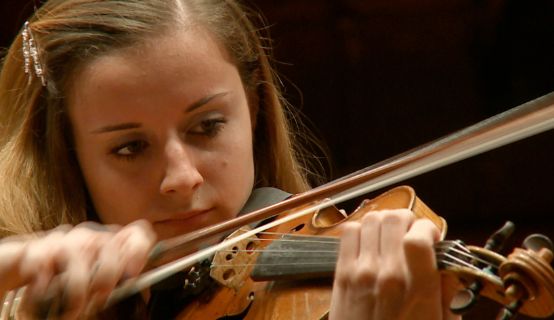A career start
In addition to school, practice and music lessons, highly talented young people also take part in competitions and public performances. How good is the support system in Switzerland and is it even possible to plan a career?

A current example is 17-year-old violinist Elea Nick from Meilen. We meet for a chat at Au Premier at Zurich main station; she is a simple, likeable, natural-looking young woman and is accompanied by her mother and manager Cornelia Nick. For her Tonhalle debut on November 1, she has chosen Tchaikovsky's Violin Concerto, which she will play with the Zurich Symphony Orchestra under the direction of Mario Beretta. A bold choice of piece, as it is one of the most difficult violin concertos of all.
The young violinist learned Russian from her teacher, the Russian violinist Zakhar Bron, with whom she has been studying for six years. She was the youngest student ever to attend Bron's lessons at the Zurich University of the Arts, where her father Andreas Nick teaches theory. Since his retirement in 2015, Bron has been setting up a music academy for gifted students in Interlaken, where Elea Nick regularly visits him. His reputation as a violin teacher is legendary; stars such as Vadim Repin, Maxim Vengerov, Daniel Hope, Laura Marzadori and David Garret were once under his wing. "I like the Russian violin school and the way Bron teaches," says Elea Nick confidently. "He is extremely precise, every note has its meaning and he doesn't let up until you have found it." Tchaikovsky's violin concerto suits her, and she will play it in public for the first time at the Tonhalle.
Focus on your career
If you look at the stages of Elea Nick's still young career, she has attracted attention on the usual platforms in Switzerland: she has won the Swiss Youth Music Competition several times, as a violinist and chamber musician, and also won a Migros Study Prize in 2015. She has already been successful at two international competitions: In Novosibirsk in 2013, she achieved first place with distinction, and in Lublin at the international Lipinski Wieniawski Competition in 2015 with a first prize.
So far so good. "But you can't plan a solo career any more than you can plan happiness, even if you do everything right to achieve it," says the internationally sought-after Swiss pianist Oliver Schnyder, who chairs the jury for the Migros Prizes. The competition among young, highly talented musicians is huge, and personal contacts in the music world are crucial for progress, as is developing one's own artistic profile.
Competitions are still important for attracting attention. "Preparing for a competition is also very intensive," says Elea Nick, "you have to deal with a huge program, and you have to do it by heart. This is extremely good preparation for concert life."
As far as communication is concerned, Elea Nick is present on Facebook and posts all messages herself. According to Oliver Schnyder, PR does play an important role today, "but only when the young artists feel and know exactly what makes them distinctive. Accordingly, they must pursue artistic projects that define and consolidate an image in such a way that a PR agency can pick it up and exploit it. It has to be authentic, unmistakable and charismatic."
According to Schnyder, the funding structures in Switzerland today no longer need to shy away from international comparison. "In the past, young people had to fight like lions to avoid being held back by the system's egalitarian tendencies." Elea Nick was lucky enough to be able to attend normal school in Meilen up to the third secondary level and was allowed a reduced school workload. She is now studying for her Matura in the art and sport course at Akad College. Switzerland also seems to have become more flexible in terms of schooling for the gifted.








